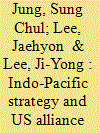|
|
|
Sort Order |
|
|
|
Items / Page
|
|
|
|
|
|
|
| Srl | Item |
| 1 |
ID:
124062


|
|
|
|
|
| Publication |
2013.
|
| Summary/Abstract |
This study aims to analyze the effects of democratic transition on alliance commitment, focusing on political leaders' types and civil-military relations. This work expects to find that democratizers are more likely to be faithful to their existing alliance partner when their political leaders are old elites who are reluctant to initiate drastic domestic reforms and when their political leaders try to reduce military's influence on domestic affairs. By tracing the process of three US allies' participation (or nonparticipation) in the US-led multinational coalition against Iraq during the Persian Gulf War period, this study explores whether and how the domestic conditions affect alliance policies. The case studies on South Korea, Turkey, and the Philippines provide some support for the nexus approach which links domestic circumstances to foreign conditions.
|
|
|
|
|
|
|
|
|
|
|
|
|
|
|
|
| 2 |
ID:
134522


|
|
|
|
|
| Summary/Abstract |
When does domestic unrest lead to interstate conflict? I present the diversionary target theory that argues that domestically troubled states are more likely to use military force against some, but not all, states because political leaders prefer targets that can evoke their domestic audience's fear or greed in order to enjoy “rally-round-the-flag” effects. I suggest that the fear-producing targets are foreign states that exhibit rapidly rising power or manifest different identities. The greed-producing targets are foreign states occupying disputed territory or exercising regional/local hegemony despite declining power. In addition, I expect that political leaders prefer fear- or greed-producing targets that possess similar powers, because domestic audiences may see initiation of military conflicts against too-powerful states or too-weak states as excessively risky and unnecessary, respectively. From statistical analyses on directed dyad-years from 1920 to 2001, I find that the presence of a rising power, a territory target, or a hegemony target contributes to the correlation between domestic unrest and the initiation of interstate conflict in a statistically significant way.
|
|
|
|
|
|
|
|
|
|
|
|
|
|
|
|
| 3 |
ID:
178700


|
|
|
|
|
| Summary/Abstract |
Will the US-led Indo-Pacific strategy lead to an extensive alliance network against China? This article shifts focus to non-Quad Asian states—in particular, Indonesia, Vietnam, and South Korea—that face a strategic dilemma in the US-China competition and examines their positions regarding a rising China and the Indo-Pacific strategy. While reluctant to join the US strategy for the Indo-Pacific region, Asian middle powers now aim to tame, rather than contain, China despite their slight variations of response to the Indo-Pacific strategy. The US and its three partners—Japan, India, and Australia—have not been successful yet in recruiting new members to their coalition, mainly because of the declining hegemon’s (seemingly) weakened commitment to a liberal international order and the rising challenger’s (potential) opposition and punishment.
|
|
|
|
|
|
|
|
|
|
|
|
|
|
|
|
| 4 |
ID:
155471


|
|
|
|
|
| Summary/Abstract |
What is the effect of the spread of nuclear weapons on interstate conflict? Do nuclearizing states invite preventive attacks? If so, which states are likely to take such military actions? After dividing states into three groups – nuclear, nuclearizing, and non-nuclear – this study argues that once a state starts to develop nuclear weapons, it becomes a likely target of preventive attacks due to its uncertain capability and intention. Nuclear states are particularly expected to be aggressive against nuclearizing states due to the former’s perceived loss from nuclear proliferation. With empirical support from a statistical analysis from 1950 to 2000, this study implies that nuclear spread decreases international security because both its process (entailing the existence of a nuclear development program) and its desired outcome (achieving development of nuclear armaments) create targets and initiators of preventive conflicts.
|
|
|
|
|
|
|
|
|
|
|
|
|
|
|
|
| 5 |
ID:
134454


|
|
|
|
|
| Summary/Abstract |
Faced with the possibility of losing their position due to domestic opposition, political leaders may sometimes consider initiating a foreign conflict as a means to redirect attention away from domestic issues. In such instances, which states are most likely to become diversionary targets? This study assumes that unpopular leaders prefer small-scale conflicts that can create rally-round-the-flag effects without triggering substantial domestic opposition to the use of military force abroad. Based on this assumption, hypotheses are developed which predict that states under constraint (i.e. states with democratic institutions or showing high trade openness) tend to attract diversionary-motivated actions, while states likely to reciprocate harshly (i.e. states experiencing their own domestic troubles or in relative decline) are less likely to become diversionary targets. Logit analyses of directed dyad-years from 1960 to 2001 and illustrations of marginal effects provide strong support for three of the four hypotheses – namely, that democracies and trading states are more likely, and that declining powers are less likely to be targets of diversionary actions. This study’s findings show that not all potential targets are equally attractive for diversionary actions, and that a state’s democratization, economic openness, and power growth can worsen, rather than improve, its security.
|
|
|
|
|
|
|
|
|
|
|
|
|
|
|
|
|
|
|
|
|